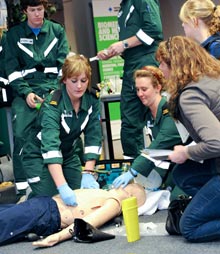Clinical learning is an important part of all of our health and biomedicine courses, and is compulsory for accredited courses in dermal therapy, midwifery, nursing, osteopathy, paramedicine.
Simulation labs & health clinics

Professional learning experiences take place in a broad range of settings such as industry, community enterprises and simulated workplace environments, and include:
- industry or community projects
- internships and placements
- fieldwork or practicum
- apprenticeships and traineeships
- co-operative education.
The College provides learning, teaching, research and practice facilities for the next generation of health professionals through VU's health & personal service clinics, industry based projects and simulation laboratories.
Osteopathy clinic
Senior students in the Master of Health Science (Osteopathy) provide treat visitors at the Osteopathy clinic, under supervision of qualified and registered osteopaths.
All students are undertaking their clinical practice and have completed extensive study of Osteopathy in the classroom and laboratory.
Dermal clinic
Treatments at the Dermal clinic are performed by trained students in the Bachelor of Dermal Sciences, under the supervision of qualified dermal clinicians.
Nursing clinical model

Our nursing clinical model is an innovative program for nursing students designed to enhance clinical learning experience, and offers students opportunities to:
- experience the true nature and challenges of contemporary nursing practice
- work alongside expert clinicians
- enjoy positive, and supportive clinical learning environments across the spectrum of nursing specialities.
Students are required to complete 100% of their clinical learning hours to be eligible for a certificate of completion and registration.
With state-of-the-art technology, our nursing and paramedic laboratory facilities are designed to simulate a hospital environment. Our nursing simulation labs enable video recording from fixed cameras with live video streaming capabilities for greater student participation in learning.
Simulation based education
The Simulated Learning program embedded within the curriculum for undergraduate nursing aims to provide students with interactive learning experiences which reinforce theoretical and practical instruction.
Simulation based education (SBE) responds to the drivers of increased patient acuity in inpatient settings, greater demand for clinical placements, shortened bed stay days in the clinical environment and the serendipitous nature of clinical experience. Through SBE, students have repeated opportunities to learn and practice, including simulated interprofessional practice, with specific and immediate feedback conducive to the development of expertise.
The emergence of interprofessional education (IPE) and practice (IPP) as a key driver of 21st century health care practice models is introduced to students in their first year. Interprofessional education provides students from two or more professions to learn together during part of their professional education to enable effective collaborative practice for providing patient-centred care and improve health outcomes.
Paramedic clinical placement

Paramedic clinical placement is an introduction to the responsibilities and experiences of the ambulance paramedic.
Under the supervision of a clinical instructor, students are progressively introduced to the responsibilities and experiences of the ambulance paramedic.
Placements occur in a variety of settings, including the Non-Emergency Patient Transport (NEPT) sector and Ambulance Victoria, and based on study level, students are given the opportunity to engage with patients as a regular paramedic would.
Contact the Clinical Placement Office
Phone: +61 3 9919 2708
Email: clinical.learning@vu.edu.au
Paramedic students email: paramedic.placements@vu.edu.au.
